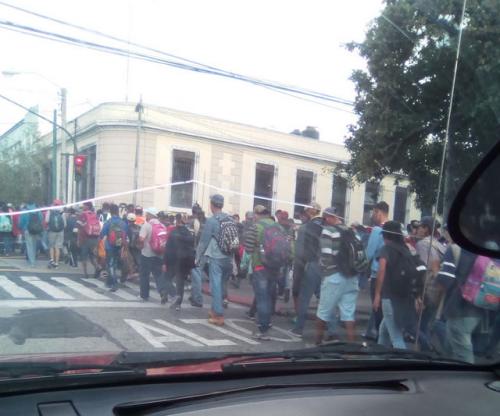Between the exodus, the humanitarian crisis and the criminalization
- Opinión

Central American migrants and the humanitarian crisis
The thousands of Central Americans, mainly Hondurans, who in recent months entered Mexico, are much more than a caravan. They are the living image and the incarnation of the humanitarian crisis of thousands of people who, escaping from the acute precariousness of their homes and communities, fled in a mass exodus. There are two main reasons for their departure: 1) structural and constant violence (organized crime, gangs and the State); 2) and acute and widespread poverty as a permanent condition of life. It is not about criminals, as the American president deliberately and treacherously lies. On the contrary, they are forced migrants, who had to leave to have an existence, not to be considered dignified, but at least livable outside their countries.
Migration, a correlate of exclusion and structural violence
Honduras, El Salvador and Guatemala, where most of the migrants are from, are among the most violent countries in the world (with very high homicide rates) and the poorest in the continent. Violence and extreme poverty, among other causes, have been related to the intrusion of the United States (US) in the region in recent decades. The EU, with its interventionist and regional control policies, has not only led to the accentuation and generalization of the processes of economic inequality and exclusion in these countries (with the consequent correlate of the accelerated growth of extreme poverty), but has also contributed to destabilizing this region, supporting authoritarian political regimes and coups d'état, generating climates prone to generalized and constant violence.
An exodus with history
These migrants have been there for many years. Central American migration began in the last century, but since at least five years ago, the average number of Central Americans who try to transit through Mexico every year to reach the United States is hundreds of thousands. They flee from the lack of work and hunger wages, but also from the violence of being extorted, assaulted and killed by gangs and organized crime groups in the region. They escape from their countries because there their lives are neither respected nor valued. They flee from a land that not only denies them the promise of a future, but, day by day, takes away the present and does not even guarantee their survival. At what point did trying to survive cease to be a right and it became a crime?
Del mismo autor
- Forced internal displacement in Mexico and processes of violence 13/03/2022
- Labor struggles against precarious work and agribusiness exploitation 09/01/2022
- Detentions, deportations, and criminalization of migrants 29/11/2021
- México: detenciones, deportaciones y criminalización de los migrantes 15/11/2021
- Visibility of migrant voices and subjects 18/10/2021
- La decolonialidad y el abordaje de las movilidades humanas transfronterizas 01/10/2021
- Migrants, social organizations, and policies to control cross-border mobility 20/09/2021
- Decoloniality and sense of the production of social knowledge 06/09/2021
- Decolonialidad y sentido de la producción de conocimiento social 26/08/2021
- México: migrantes, organizaciones sociales y políticas del control de las movilidades transfronterizas 09/08/2021
